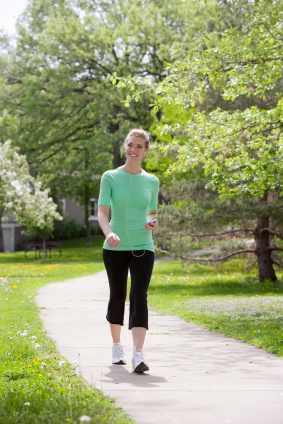Many people either get so exhausted while dieting that they cannot keep up their exercise programme, or they get up early in the morning, skip breakfast and go to the gym for a strenuous workout - a situation which leaves them feeling limp for the rest of the day.
The human body is designed to use fuel derived from the food we eat to support physical exertion, such as exercise. The best, and most readily available source of body fuel, can be obtained from carbohydrate foods. If you eat a diet that is either so low in total energy that it cannot support exercise, or a low- or zero-carbohydrate diet, your body will be starved of the energy it requires for exercise.
Starvation diets are generally not a good idea for the following reasons:
- The lack of energy makes you feel tired, listless, irritable and unmotivated.
- Trying to combine a starvation diet with a strenuous workout programme is doomed to failure, because your body will not be able to meet the demands of exercise if you don’t provide it with some readily available fuel.
- Deficiencies can occur that can also make you feel tired (e.g. iron and vitamin B12 deficiencies, which can cause anaemia).
- The human body correctly perceives 'starvation' as a threat to its well-being and will aim to shut down weight-loss mechanisms in an attempt to conserve energy stored in fat.
Solution to exhaustion caused by starvation diets
The solution to the kind of exhaustion you experience when you're on a starvation diet, combined with a strict exercise regime, is to change over to a diet that provides:
- Moderate energy reduction (to promote weight loss)
This type of diet will make you feel much more energetic and will enable you to do your exercise without feeling exhausted all the time.
The best examples of people who eat lots of complex carbohydrates and little fat are top athletes, such as the cyclists who participate in the Tour de France.
In a scientific article on diets for top athletes, cyclists were found to obtain up to 70% of their energy from complex carbohydrates, while the fat and protein contents of their diets were approximately 10-15% and 15-20% respectively.
If a high-carbohydrate, low-fat diet works for athletes, it will also work for you. This type of diet will provide sufficient energy for exercise while helping you lose weight.
Skipping breakfast before exercise
Because of time constraints, some people don't eat breakfast before they start exercising. Others skip breakfast intentionally in the erroneous belief that exercising on an empty stomach after an overnight fast will help them burn more fat.These ideas are self-defeating. You need fuel to be able to exercise. If your last meal was at 7pm in the evening and you get up at 5am and go straight to the gym for a workout, your body will have been deprived of food for 10 hours. Your blood-sugar levels will be very low and there will be little or no fuel available for physical activity. You'll feel exhausted for the rest of the day.
Solutions for early exercise
If your work or study schedule forces you to exercise early in the morning, you need to do the following to ensure sufficient energy levels:- Get up a bit earlier to have a light breakfast (oats with fat-free milk or yoghurt, a fruit such a banana or apple and a glass of fruit juice).
- Use an energy drink while you're exercising (there are a variety of such drinks to choose from, e.g. Powerade, Energade, Lucozade etc. Do a little experiment to figure out which energy drink agrees best with you).
- Have some more of the energy drink immediately after exercising to refuel your body and brain.
- Take a packed snack along to work to eat between 8am and 10am, when you start feeling hungry (e.g. fat-free yoghurt with high-fibre cereal and honey, or fresh fruit and fat-free cottage cheese, or Provitas/wholewheat or rye crackers or wholewheat bread with lean sliced meat or canned tuna packed in brine with salad vegetables such as cucumber, lettuce, tomatoes, gherkins or celery).
- Have a light lunch that contains some complex carbohydrates (baked potato, brown rice or pasta made from 100% durum wheat), small portions of lean meat or fish or a boiled egg, vegetables such as listed above or carrots, peas, corn on the cob). Pack a lunch if you don’t have a canteen at work or if the canteen only provides fatty meals.
– (Dr I.V. van Heerden, DietDoc, updated April 2011)
Any questions? Ask DietDoc




 Publications
Publications
 Partners
Partners















